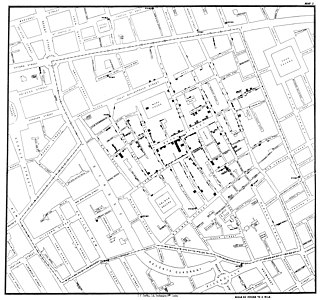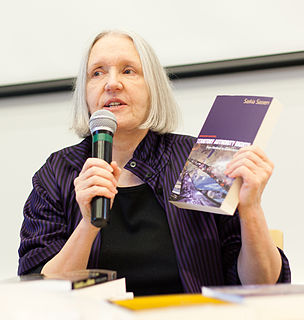
Human geography or anthropogeography is the branch of geography that is associated and deals with humans and their relationships with communities, cultures, economies, and interactions with the environment by studying their relations with and across locations. It analyzes patterns of human social interaction, their interactions with the environment, and their spatial interdependencies by application of qualitative and quantitative research methods.
Regional science is a field of the social sciences concerned with analytical approaches to problems that are specifically urban, rural, or regional. Topics in regional science include, but are not limited to location theory or spatial economics, location modeling, transportation, migration analysis, land use and urban development, interindustry analysis, environmental and ecological analysis, resource management, urban and regional policy analysis, geographical information systems, and spatial data analysis. In the broadest sense, any social science analysis that has a spatial dimension is embraced by regional scientists.
An information society is a society where the usage, creation, distribution, manipulation and integration of information is a significant activity. Its main drivers are information and communication technologies, which have resulted in rapid information growth in variety and is somehow changing all aspects of social organization, including education, economy, health, government, warfare, and levels of democracy. The people who are able to partake in this form of society are sometimes called either computer users or even digital citizens, defined by K. Mossberger as “Those who use the Internet regularly and effectively”. This is one of many dozen internet terms that have been identified to suggest that humans are entering a new and different phase of society.

Economic geography is the subfield of human geography which studies economic activity and factors affecting them. It can also be considered a subfield or method in economics. There are four branches of economic geography. There is, primary sector, Secondary sector, Tertiary sector, & Quaternary sector.
The knowledge economy is an economic system in which the production of goods and services is based principally on knowledge-intensive activities that contribute to advancement in technical and scientific innovation. The key element of value is the greater dependence on human capital and intellectual property for the source of the innovative ideas, information and practices. Organisations are required to capitalise this "knowledge" into their production to stimulate and deepen the business development process. There is less reliance on physical input and natural resources. A knowledge-based economy relies on the crucial role of intangible assets within the organisations' settings in facilitating modern economic growth.

Urban geography is the subdiscipline of geography that derives from a study of cities and urban processes. Urban geographers and urbanists examine various aspects of urban life and the built environment. Scholars, activists, and the public have participated in, studied, and critiqued flows of economic and natural resources, human and non-human bodies, patterns of development and infrastructure, political and institutional activities, governance, decay and renewal, and notions of socio-spatial inclusions, exclusions, and everyday life.
Feminist geography is a sub-discipline of human geography that applies the theories, methods, and critiques of feminism to the study of the human environment, society, and geographical space. Feminist geography emerged in the 1970s, when members of the women's movement called on academia to include women as both producers and subjects of academic work. Feminist geographers aim to incorporate positions of race, class, ability, and sexuality into the study of geography. The discipline has been subject to several controversies.

World-systems theory is a post-Marxist multidisciplinary approach to world history and social change which emphasizes the world-system as the primary unit of social analysis.

Saskia Sassen is a Dutch-American sociologist noted for her analyses of globalization and international human migration. She is Robert S. Lynd Professor of Sociology at Columbia University and Centennial visiting Professor at the London School of Economics. Sassen coined the term global city.
Transnationalism is a scholarly research agenda and social phenomenon grown out of the heightened interconnectivity between people and the receding economic and social significance of boundaries among nation states.
Erik Achille Marie Swyngedouw is professor of geography at the University of Manchester in the School of Environment, Education and Development and a member of the Manchester Urban Institute.
Ash Amin, is a British academic known for his writing on urban and regional development, contemporary cultural change, progressive politics, and the collaborative economy. He holds the 1931 chair at the Department of Geography, University of Cambridge. Since September 2015 he has held the post of foreign secretary of the British Academy.

Doreen Barbara Massey was a British social scientist and geographer. She specialized in Marxist geography, feminist geography, and cultural geography, as well as other topics. She was Professor of Geography at the Open University.

Geography is a field of science devoted to the study of the lands, features, inhabitants, and phenomena of the Earth and planets. The first person to use the word γεωγραφία was Eratosthenes. Geography is an all-encompassing discipline that seeks an understanding of Earth and its human and natural complexities—not merely where objects are, but also how they have changed and come to be.

The sociology of space is a sub-discipline of sociology that mostly borrows from theories developed within the discipline of geography, including the sub fields of human geography, economic geography, and feminist geography. The "sociology" of space examines the social and material constitution of spaces. It is concerned with understanding the social practices, institutional forces, and material complexity of how humans and spaces interact. The sociology of space is an inter-disciplinary area of study, drawing on various theoretical traditions including Marxism, postcolonialism, and Science and Technology Studies, and overlaps and encompasses theorists with various academic disciplines such as geography and architecture. Edward T. Hall developed the study of Proxemics which concentrates on the empirical analysis of space in psychology.
Yehua Dennis Wei is a Chinese-American geographer. He is a professor in the Department of Geography and a senior scholar in the Institute of Public and International Affairs at the University of Utah. His research has been funded by the NSF, Lincoln Institute of Land Policy, National Geographic Society, Ford Foundation and Natural Science Foundation of China (NSFC). He has received awards for research excellence from the NSFC, Association of American Geographers’ (AAG) China, Asian and Regional Development and Planning Specialty Groups, and University of Wisconsin-Milwaukee.RESEARCH INTERESTS: Economic/Urban Geography, Urban and Regional Development, Spatial Inequality, Sustainable Cities, GIS Spatial Analysis, China, and the United States.

Stephen Gill, FRSC is Distinguished Research Professor of Political Science at York University, Toronto, Ontario, Canada. He is known for his work in International Relations and Global Political Economy and has published, among others, Power and Resistance in the New World Order, Power, Production and Social Reproduction, Gramsci, Historical Materialism and International Relations (1993), American Hegemony and the Trilateral Commission (1990) and The Global Political Economy: Perspectives, Problems and Policies.

Agricultural geography is a sub-discipline of human geography concerned with the spatial relationships found between agriculture and humans. That is, the study of the phenomenons and effects that lead to the formation of the earth's top surface, in different regions.
Global Production Networks (GPN) is a concept in developmental literature which refers to "the nexus of interconnected functions, operations and transactions through which a specific product or service is produced, distributed and consumed."

Geoffrey Alan Lawrence is an Australian sociologist, academic and researcher. He is Emeritus Professor of Sociology at the University of Queensland.










